 June 2023 in “British journal of dermatology/British journal of dermatology, Supplement”
June 2023 in “British journal of dermatology/British journal of dermatology, Supplement” Madam C.J. Walker became the first self-made female millionaire in the USA by creating a successful hair care product for Black women.
3 citations,
January 2019 in “Research journal of pharmacy and technology” The hair tonic with menthol grew longer hair, but both formulas had similar overall hair growth.
 January 2018 in “International journal for pharmaceutical research scholars”
January 2018 in “International journal for pharmaceutical research scholars” Meniran extract hair tonic may stimulate hair growth in rats, with the version containing 1% menthol being more effective.
 February 2022 in “Research Journal of Biotechnology”
February 2022 in “Research Journal of Biotechnology” Eclipta alba L. is a medicinal plant with many health benefits, including treating diseases and promoting hair growth.
1 citations,
January 2019 in “Journal of pharmacy & pharmacognosy research” The flavonoid-rich extract of Equisetum hyemale can help regrow hair in cases of alopecia.
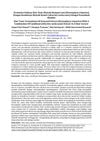 April 2024 in “Jurnal Agroindustri Halal/Jurnal agroindustri halal”
April 2024 in “Jurnal Agroindustri Halal/Jurnal agroindustri halal” The hair tonic with the highest seaweed extract content showed the best hair growth results.
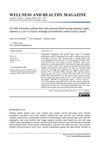
Long bean leaf juice significantly promotes hair growth.
 August 2021 in “Journal of Fundamental and Applied Pharmaceutical Science”
August 2021 in “Journal of Fundamental and Applied Pharmaceutical Science” Black tea extract at 5% concentration promotes the most hair growth.
 19 citations,
May 2016 in “Clinical, cosmetic and investigational dermatology”
19 citations,
May 2016 in “Clinical, cosmetic and investigational dermatology” FGF-2&D/P nanoparticles can help treat hair loss.
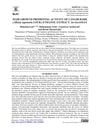 1 citations,
January 2022 in “Rasayan journal of Chemistry”
1 citations,
January 2022 in “Rasayan journal of Chemistry” Albizia saponaria bark ethanol extract, particularly at 15%, promotes hair growth in rabbits.
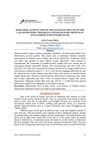 October 2022 in “Asian journal of healthy and science”
October 2022 in “Asian journal of healthy and science” Mother-in-law's tongue leaf extract at 20% concentration significantly promotes hair growth in male rabbits.
 2 citations,
January 1994 in “Journal of S C C J”
2 citations,
January 1994 in “Journal of S C C J” The study concluded that certain hair growth measurements are good indicators of baldness severity and provide a more accurate assessment than subjective grading.
1 citations,
November 2017 in “JFL : Jurnal Farmasi Lampung” Nothopanax scutellarium extract can effectively promote hair growth in male rabbits.
 179 citations,
September 1998 in “BMJ”
179 citations,
September 1998 in “BMJ” Hair loss in men is common, treatable, but not curable.
 10 citations,
January 1996 in “Journal of Dermatological Treatment”
10 citations,
January 1996 in “Journal of Dermatological Treatment” Herbal preparation effectively promotes hair growth and reduces hair loss.
 5 citations,
November 2017 in “Asian journal of pharmaceutical and clinical research”
5 citations,
November 2017 in “Asian journal of pharmaceutical and clinical research” Pakis Gajah (Angiopteris evecta) water extract may promote hair growth in rabbits, but more research is needed for human use.
 1 citations,
November 2021 in “Jurnal Farmasi Indonesia”
1 citations,
November 2021 in “Jurnal Farmasi Indonesia” Secang wood extract hair tonic promotes hair growth and meets quality standards.
May 2024 in “Molecules/Molecules online/Molecules annual” Plant extracts can help prevent hair loss and promote hair growth.
 July 2023 in “Research journal of pharmacy and technology”
July 2023 in “Research journal of pharmacy and technology” The hair tonic with Capsicum frutescens extract helps hair grow in male rabbits.
 June 2023 in “MPI (Media Pharmaceutica Indonesiana)”
June 2023 in “MPI (Media Pharmaceutica Indonesiana)” A hair tonic made from kale leaves is effective for hair growth and meets Indonesian standards.
January 2016 in “Journal of chemical and pharmaceutical research” Angiopteris evecta extracts significantly promote hair growth in rabbits.
 1 citations,
August 2020 in “Food Research”
1 citations,
August 2020 in “Food Research” Plant extracts like Avicennia marina, Boehmeria nipononivea, and Camellia sinensis could potentially treat hair loss with fewer side effects than synthetic drugs.
1 citations,
October 2019 The 1:5 ratio of fragrant pandan to celery extract best promotes hair growth.
August 2019 in “Pharmacoscript” The 3:2 combination of pandanus and sansevieria leaf extracts promotes the best hair growth.
1 citations,
December 2021 in “Jurnal Insan Farmasi Indonesia” Pomade with 12% ethanol extract of Momordica charantia L. leaves promotes the most hair growth.
 January 2023 in “Acta medica Philippina”
January 2023 in “Acta medica Philippina” Papaya flower extract may help with hair growth by blocking a hair loss enzyme and acting as an antioxidant.
December 2014 in “대한피부미용학회지” Natural hair-loss preventers from plants and herbs are becoming popular due to fewer side effects and added benefits.
 77 citations,
March 2001 in “Clinics in Dermatology”
77 citations,
March 2001 in “Clinics in Dermatology” Androgenetic alopecia involves genetics, hormones, and can be treated with medications or surgery.
August 2023 in “Health Sciences and Pharmacy Journal” Herbal therapies may effectively treat alopecia with fewer side effects than synthetic drugs.
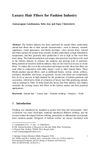 6 citations,
January 2016 in “Environmental footprints and eco-design of products and processes”
6 citations,
January 2016 in “Environmental footprints and eco-design of products and processes” The industry should promote pure luxury hair fibers, improve technology, and diversify products to support growers and ensure sustainable use.




















